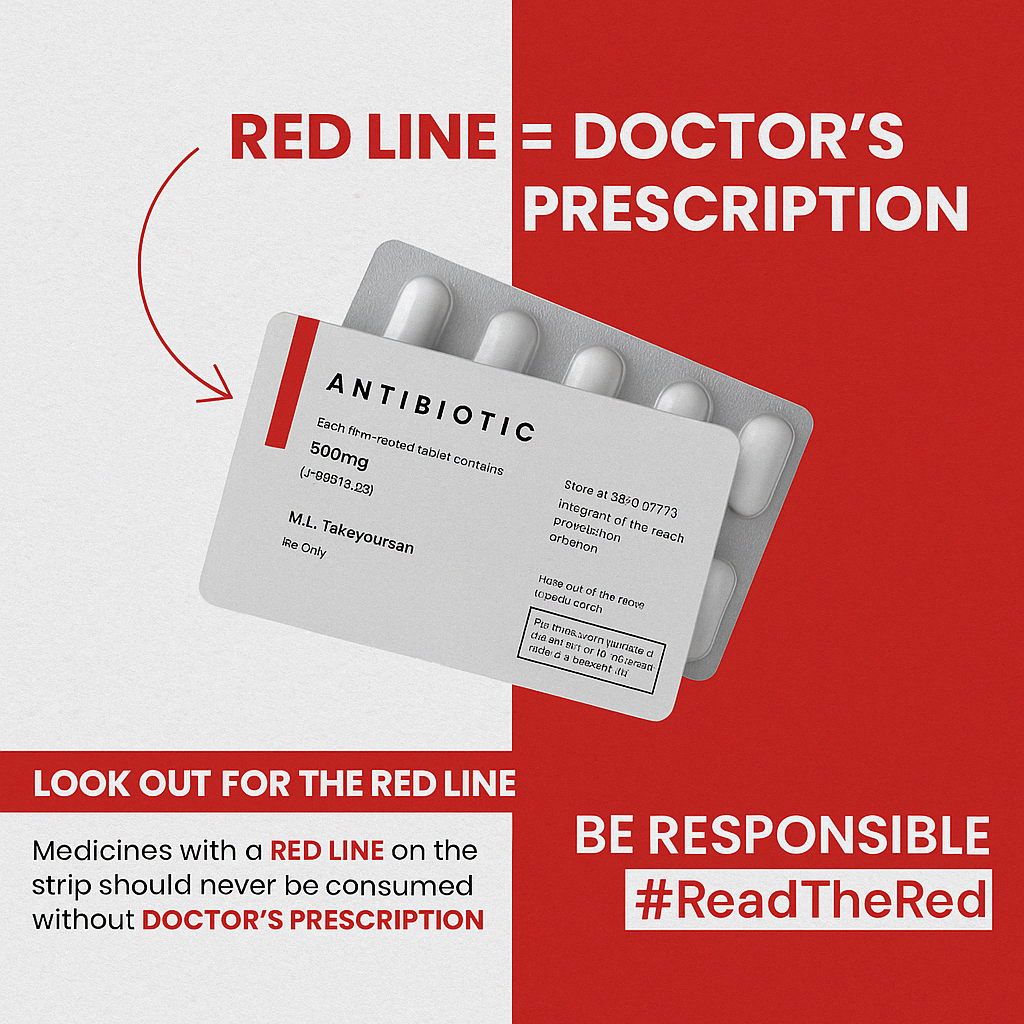If you look closely at medicine packaging in India, you may spot a red line on the strip or bottle. This isn’t a design feature — it’s a warning.
Red line medicines are prescription-only drugs, typically antibiotics, anti-TB drugs, and certain psychotropic medications, that must not be consumed without medical supervision.
The red line indicates that these are “Schedule H1 drugs” under Indian drug regulations. They are powerful medications, and using them improperly can cause more harm than good.
Why You Shouldn’t Self-Medicate with Antibiotics
Antibiotics are designed to treat bacterial infections — not viral ones like the common cold or flu. Misusing them can lead to antibiotic resistance, one of the biggest health threats today.
Here’s how self-medicating with antibiotics can harm you:
- Kills helpful bacteria in the body
- Leads to partial treatment, giving surviving bacteria a chance to adapt
- Delays proper diagnosis, especially if symptoms are being masked
- Can cause side effects such as diarrhea, allergic reactions, or organ damage
- Increases the risk of developing drug-resistant infections
What Is Antibiotic Resistance?
Antibiotic resistance occurs when bacteria adapt in ways that make antibiotics ineffective. This means common infections become harder — and sometimes impossible — to treat.
Examples of resistant infections:
- Drug-resistant tuberculosis (DR-TB)
- Methicillin-resistant Staphylococcus aureus (MRSA)
- Multi-drug-resistant urinary tract infections (UTIs)
According to the World Health Organization (WHO), 700,000 people die globally each year due to drug-resistant infections — and the number is rising.
In India, the situation is serious. Studies by the Indian Council of Medical Research (ICMR) show rising resistance to frontline antibiotics, especially in hospitals.
What the Red Line Campaign Aims to Do
India’s Red Line campaign, launched by the Ministry of Health and Family Welfare, seeks to raise public awareness about responsible use of antibiotics.
Its goals include:
- Reducing self-medication and over-the-counter misuse
- Encouraging doctors to prescribe antibiotics only when necessary
- Urging pharmacies to refuse sale without prescription
- Promoting patient education on the importance of completing prescribed courses
What You Should Do as a Responsible Patient
To protect your health and prevent antibiotic resistance:
- Always consult a doctor before taking antibiotics
- Do not demand antibiotics for viral infections like colds or sore throats
- Never reuse leftover medicines from past illnesses
- Do not share antibiotics with others
- Complete the full course of prescribed medication, even if symptoms improve
- Buy medicines only from licensed pharmacies and check for the red line
How Doctors and Chemists Can Help
Healthcare providers have a critical role in controlling antibiotic misuse. They should:
- Explain the risks of unnecessary antibiotic use to patients
- Only prescribe antibiotics when there is clear bacterial evidence
- Avoid overprescribing broad-spectrum antibiotics
- Report suspected resistant cases to public health authorities
Pharmacists should:
- Avoid selling red line medicines without a valid prescription
- Guide patients on proper usage and storage
- Display public awareness posters at their counters
Real Impact: One Misuse Can Endanger Many
A single instance of overuse doesn’t just affect one person. It can create a strain of resistant bacteria that spreads to others — in households, hospitals, or communities.
That’s why responsible use of red line medicines is not just a personal choice — it’s a public health necessity.


